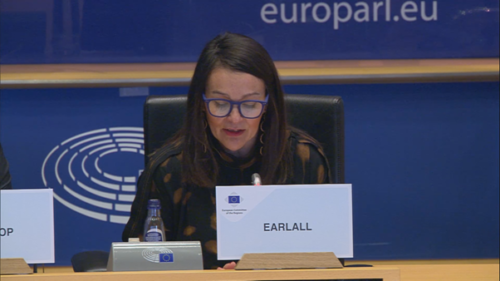EARLALL highlights the role of its regions at the 153rd CoR Plenary Sessions
14/02/2023

The Members of the European Committee of the Regions (CoR) held a meeting for the 153rd Plenary Session on 8 February – 9 February 2023. On 9 February, Noelia Cantero, Director of the European Association of Regions and Local Authorities for Lifelong Learning (EARLALL), was invited to the CoR Plenary session for the Debate on the European Year of Skills 2023, as proposed by the European Commission in October 2022.
The European Year of Skills was announced by European Commission President, Ursula Von der Leyen, during her third State of the Union Address before the Members of the European Parliament in Strasbourg on 14 September 2022. Building upon this, on 17 January 2023, the European Commission released a Communication on Harnessing talent in Europe’s regions which acted as the first deliverable of the European Year of Skills 2023. The Communication underlines the need for ‘good skills intelligence and close cooperation between regional and local authorities, social partner organisations, public and private employment services, local businesses and education and training providers, to ensure that the jointly deployed education, training and lifelong learning efforts focus on the right skills needed in a particular region.’ From within this context, the Committee of the Regions (CoR) hosted a debate on the Commission’s proposed European Year of Skills.
The debate was opened by Nicolas Schmit, Commissioner for Jobs and Social Rights. He brought the urgent need for digital upskilling during the twin transition to the forefront. He also stressed that ‘we will not send millions of people back to school, we will need to find an innovative way to educate them.’ Dragoş Pîslaru (RO/RENEW E.), Chair of the Committee on Employment and Social Affairs of the European Parliament, built on Mr Schmit’s statement, by adding that the ‘European Year of Skills is about ensuring that nobody gets left behind…. In a twin, but also, just transition’.

During her intervention, Noelia Cantero, Director of the European Association of Regional & Local Authorities for Lifelong Learning (EARLALL), agreed with all the speakers invited to the debate. However, she added that ‘For the European Year to be a success, and in line with the Communication on Harnessing Talent in Europe’s regions, the regional and local levels must be further stressed, and the acquisition of skills should be understood in a lifelong learning context which includes, but is broader than only, responding to labour market needs.’
She referred to how EARLALL, as a network of member regions, is currently working to share challenges and good practices, acquire new knowledge and participate in joint projects in a wide range of topics: from Vocational Excellence to Youth entrepreneurship, NEETs, or Smart Specialisation Strategies, funded under Erasmus+ and Interreg Europe and led mostly by regional authorities.
Ms Cantero closed her speech by informing the CoR of EARLALL’s recently launched Gender Equality Task Force, saying ‘Gender equality is essential to achieve full human potential and sustainable development.’ In this light, the harnessing of skills brought on during the European Year of Skills should be done so with parity and inclusiveness in mind.
In summary, the CoR debate was a rich opportunity for EARLALL to represent their regions’ interests and to learn from the European Commission and the European Parliament on their priorities and expectations for the opportunities for regions during the Year of Skills. In turn, EARLALL’s network is already planning and developing many events and activities for the Year of Skills, including a high-level exchange between its regions and members on June 20-21 and a capacity-building webinar series, the EARLALL Academy, for its members.
You can watch the full CoR debate here.
[ssba-buttons]

